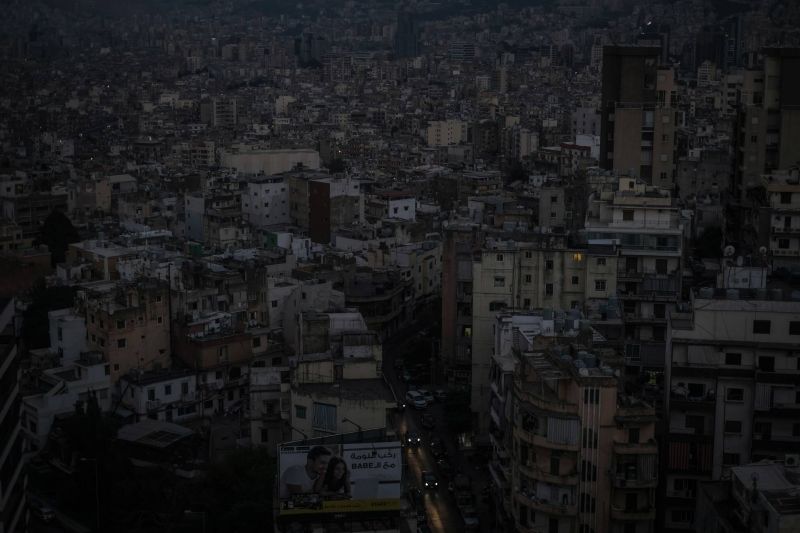
Lebanon’s capital, darkened by a near-complete lack of electricity. (Credit: João Sousa/L’Orient Today)
Want to get the Morning Brief by email? Click here to sign up.
Lebanon’s outgoing energy minister will meet with his Syrian, Egyptian and Jordanian counterparts this morning to begin discussions on a deal for the delivery of Egyptian gas to Lebanon in a bid to help ease severe power blackouts. The plan is part of a US-coordinated effort with Egypt and Jordan to help deliver natural gas via the Arab Gas Pipeline, which runs from Egypt’s Sinai Peninsula to Jordan, Syria and Lebanon. The delegates will meet in Amman to discuss whether the infrastructure that would transport the gas to Lebanon is in good condition in addition to other logistical, technical and financial requirements. However, several potential hurdles need to be addressed before imports can start powering Lebanon, including existing US sanctions on Syria under the Caesar Act, funding, and whether the infrastructure is damaged and needs repairs. Residents of Lebanon currently face electricity blackouts of up to 22 hours per day.
Disagreements over a cabinet lineup have likely postponed an expected meeting between Michel Aoun and Najib Mikati today. Following an initial surge of optimism at the beginning of the week, talks between the president and premier-designate, who must agree on the makeup of a new government, appear to have hit familiar snags over Christian representation and who will head the Economy Ministry, local media reported. Amid the impasse, Moustapha El-Solh — the Monaco-based great grand-nephew of independent Lebanon’s first prime minister, an in-law of Mikati’s brother and a top executive at the premier-designate’s M1 Group — has begun to mediate, our sister publication L’Orient-Le Jour reported. Mikati is the third prime minister-designate in the space of a year to attempt to come to terms with the president over a new government.
Twenty liters of gas may cost as much as LL350,000 by the end of the week as industry insiders say a total end to fuel subsidies is imminent. Georges Brax, a spokesperson for the gas station owners’ syndicate, told VDL radio 93.3 that the subsidies would end “within days.” The announcement comes as Banque du Liban’s subsidies on fuel have ended incrementally since the middle of the year — first shifting from financing fuel imports at the official peg of about LL1,500 to the US dollar to LL3,900 at the end of June, and then to a rate of LL8,000 to the greenback at the end of August. Shifting the subsidy rate has done little to ease the shortages of recent months, which have led to queues and even security incidents at gas stations as cars wait for hours to get what fuel they can. The central bank declined to comment on when subsidies would end.
Bakeries in northern Lebanon have announced that they will close their doors indefinitely starting today due to flour and diesel shortages. The president of the union of bakery owners in the north, Tarek el-Mir, said in a speech that the government had failed to take the necessary actions to ensure the proper distribution of flour and diesel to the north. Shortly after the announcement, Tripoli Mayor Riad Yamak said diesel would be distributed on Wednesday and that flour distribution would take place in accordance with plans set forth by the Economy Ministry, urging local residents not to panic.
The Lebanese University workers’ association has called for a strike starting today. “After we challenged the most difficult conditions and continued our work despite roadblocks, health conditions and economic problems, we reached a stage today were we are no longer able to secure basic daily life needs,” the group said in a statement. As the prices of essential goods have increased while salaries paid out in lira plummet in value, workers at the Lebanese University say their earnings are no longer sustainable and are demanding that social assistance be sped up, hospitalization costs be covered and transportation fees be paid for.
A former army intelligence chief and a former customs chief for Beirut are set to be interrogated today by the lead investigator of the Beirut port explosion. The questioning of Camille Daher, the former intelligence chief, was already postponed in late August after his lawyers filed a formal appeal. Moussa Hazimeh, meanwhile, had been charged in the case last November. Investigator Tarek Bitar has been attempting to push ahead with the explosion investigation, which has been stalled for more than a year with no officials being held accountable despite ample evidence that many knew about the presence of the ammonium nitrate that would explode at the port on Aug. 4, 2020. Former Minister Youssef Fenianos’ hearing session was also postponed this week after his lawyers presented two formal appeals. Bitar this week arrested Sami Hussein, the former operations head at the Beirut port, after interrogating him for five hours in relation to the port explosion. The previous week, Hani Hajj Shehadeh, a former senior customs official, was arrested after a six-hour interrogation.